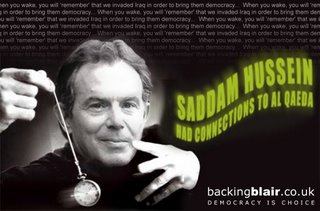Blair flies to Bush's side to mount strong defence of Iraq invasion
 Tony Blair plans to use the formation of a new Iraqi government as a strong defence of his backing of the Iraq war, and claim that this merely represents a policy of interventionism that he has previously employed in Kosovo and Sierra Leone, with great public approval.
Tony Blair plans to use the formation of a new Iraqi government as a strong defence of his backing of the Iraq war, and claim that this merely represents a policy of interventionism that he has previously employed in Kosovo and Sierra Leone, with great public approval.
Mr Blair will say he floated the idea of humanitarian interventionism, dubbed "liberal imperialism" by some of his advisers, in a speech in Chicago in 1999.
In the last of three speeches on foreign policy, Mr Blair will call for reform of the United Nations, saying that today's international institutions were designed for the Cold War era.
He believes that the UN's failure to approve a fresh resolution authorising military action in Iraq in 2003 showed that the organisation shies away from rather than confronts problems.
To be fair to Blair, this is not some new stance that he is adopting, but rather the continuation of an argument that he has long made.
Early in his Premiership, Blair made a scarcely reported speech in his Sedgwick constituency in which he called for the renegotiation of the Treaty of Westphalia.
The Treaty of Westphalia was the first time that we recognised the sovereignty of other nations and our inability to interfere in their affairs.
Blair has long argued for intervention in other nation's affairs when they are said to be mistreating their populace, so when he flies to Bush's side in Washington to reiterate these points, he will be arguing a well versed Blair discourse.
However, when he attempts to fit Iraq into his own interventionist logic, he will circumnavigate why this intervention was unpopular as opposed to his similar ventures into Kosovo and Sierra Leone.
The interventionist arguments that both Bush and Blair presented for going into Iraq were all based on events that had taken place a full decade before their proposed war, events in which both respective countries - the US and Britain - had been very slow to condemn.
Kosovo had an ongoing humanitarian crisis, which is why the world supported something being done.
The argument that Saddam had "gassed his own people" had none of the same immediacy, as this was something he had been done a decade earlier, and there was no indication that he was about to do so again.
Likewise, Blair's claims that the UN "shies away from rather than confronts problems" seems to betray a fundamental misunderstanding of what the UN's function is.The UN will always view war as a last resort, that is one of the basic elements of it's Charter.
So Blair will attempt, once again, to refashion his political legacy by seeking to portray the Iraq war as a continuation of more noble ventures.
He will fail.
For he is comparing apples to oranges.
Bush and Blair did not enter into Iraq to bring chaos to an end. Indeed, it could be argued that their intervention produced the total opposite.
Iraq was undeniably harshly ruled under Saddam, but it also cannot be denied that Saddam produced order.
Order, the most basic requirement which any society needs to be able to function, is something that Bush and Blair have been unable to restore in three long years.
This is one of the myriad of reasons for the Iraq war's unpopularity.
The Iraq war has not helped the Iraqi people. Bush and Blair's fatal error was that they assumed that democracy was the opposite of tyranny, and that they simply had to remove a tyrant in order for democracy to rush in and fill the void.
The opposite of tyranny is actually anarchy, and that is what they have unleashed.
And that is why, try as he might, Blair will never succeed in making this intervention popular.
Tags:























No comments:
Post a Comment